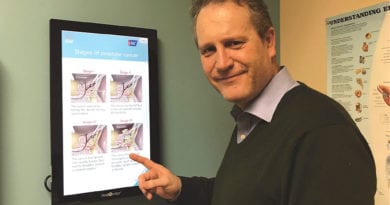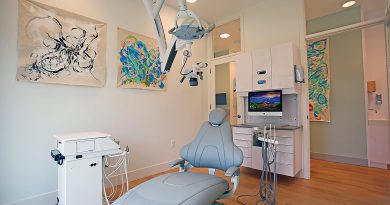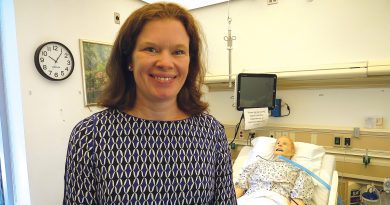Baystate’s Mobile Medical Unit Will Put a Focus on Prevention
Where the Rubber Meets the Road
By George O’Brien
‘Prevention block parties.’
That’s the phrase Dr. Kevin Hinchey contrived to described just one of the developments that might come with the arrival later this year of what’s being called the TD Bank-Baystate Health Bus.
It’s not really a bus, but rather a recreational vehicle, said Hinchey, chief Education officer and medical director at Baystate Health and associate dean of Education at UMass Medical School – Baystate. And it won’t be administering care as much as it will be working to help prevent health problems.
Which brings us to the prevention block-party concept — bringing the bus, or mobile medical unit, as it’s being called, to a block, or a park, or perhaps a business, and staging programs and discussions focused on prevention and creating roads to a healthier lifestyle.
“We could have a barbecue pit that could be towed behind it,” said Hinchey. “Maybe some of the chefs from local restaurants could prepare healthy foods, and the Food Bank could be there, and we could distribute fresh produce and show people how to cook these foods, and maybe prompt people to say, ‘I’ve never had kale before, but if you show me how to cook it, maybe I’ll start eating it.’”
That’s just one of the many intriguing scenarios that Hinchey and others can envision perhaps becoming reality through this vehicle, funded through the TD Ready Challenge Grant and announced at an elaborate press conference last month.
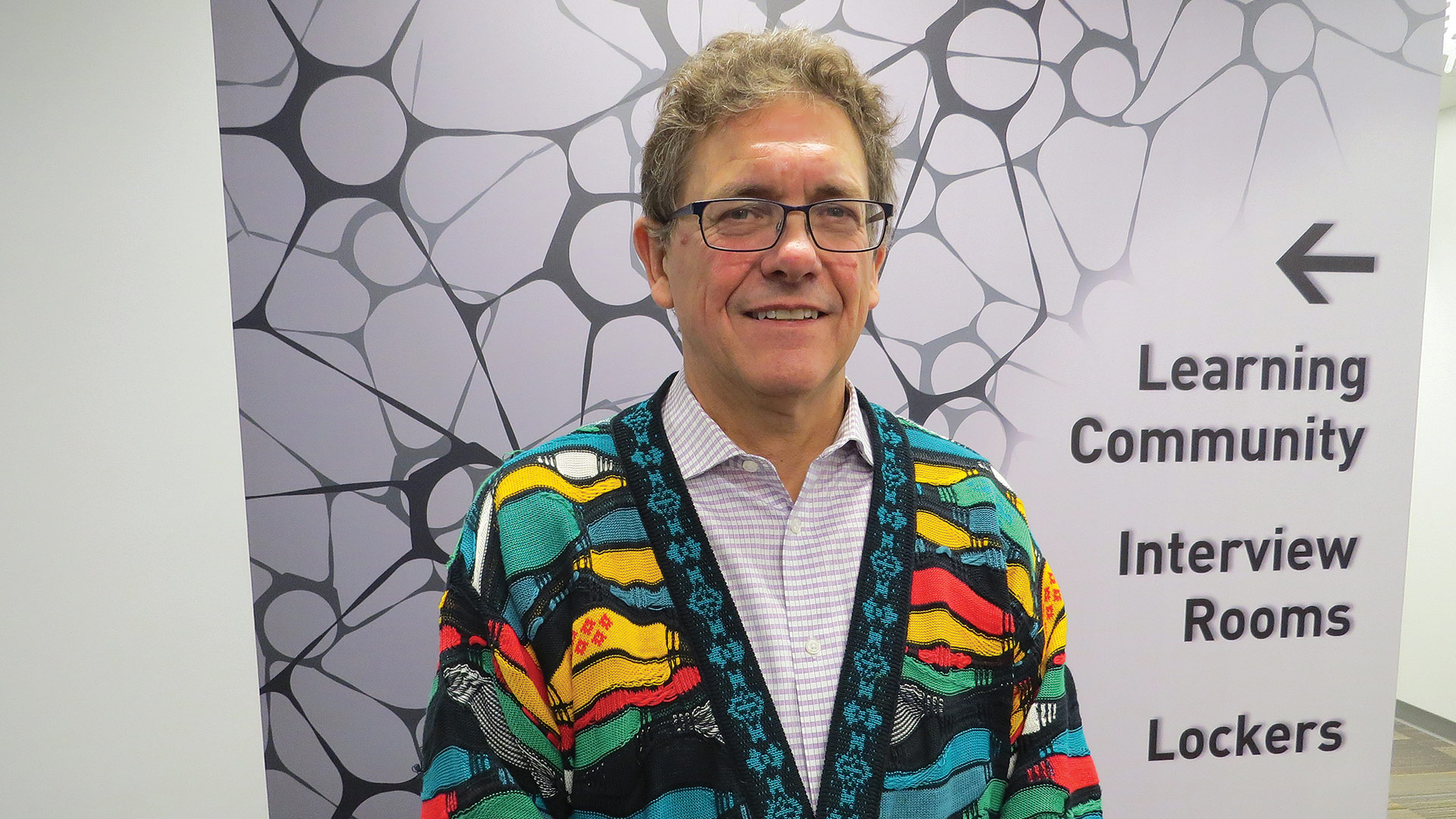
It represents part of a cultural shift in healthcare and also part of the operating mindset at UMass Medical School – Baystate, said Hinchey, adding that, for a long time now, the focus on been on the physician — and people coming to the physican when they are in need of care.
Increasingly, the focus is shifting to the community — specifically, bringing healthcare providers and professionals into the community, he went on, citing, as examples, students at the medical school visiting jails, homeless shelters, and other facilities to talk with individuals and help them understand their health problems and the reasons behind them.
“We have always been very doctor-centric, and we’re trying to move away from that and become more team-focused and go out into the community,” he explained, adding that the mobile medical unit is an extension of these efforts, and it will bring new learning opportunities for a program known as PURCH (Population-based Urban and Rural Community Health).
“This program will give [students] different experiences that they wouldn’t normally have,” he explained. “And we’re going to bring up the next generation of providers with the mindset that people don’t always come to us — we have to go to them and meet people where they are. This is experiential learning that will stick with you.”
“This program will give them different experiences that they wouldn’t normally have. And we’re going to bring up the next generation of providers with the mindset that people don’t always come to us — we have to go to them and meet people where they are. This is experiential learning that will stick with you.”
Elaborating, he said that, by visiting individuals in jails, medical students learn about how substance abuse, poverty, unemployment, and other factors contribute to one’s overall health and the decisions they make — good or bad. The bus will provide more of the same.
“They can learn some things they might not learn simply by listening to someone lecture in a room,” he went on. “That’s what happens when you go out and see people in their environment — not in your environment.”
Thus, the mobile medical unit will be creating unique learning experiences, for both area residents and those who will be staffing this vehicle.
For this issue, HCN talked at length with Hinchey about these opportunities and what forms they may take. Suffice it so say, he and others are very anxious to get this show on the road.
Pedal to the Metal
Retracing the steps that led to the announcement of the mobile medical unit, Hinchey said it all started with a request for proposals for the TD Ready Challenge Grant focused on prevention.
At a meeting in August, officials at Baystate, after consulting with a number of community partners, considered a wide range of options, he said, adding that the health system already had a number of programs within the broad realm of prevention, such as blood-pressure screenings at Martin Luther King Jr. Family Services, educational initiatives on nutrition, and similar steps.
“Those partners said they liked what we’re doing but wished that we had the ability to do more of it,” said Hinchey. “It dawned on us that a mobile office would be a way for us to go to people instead of people having to come to us.
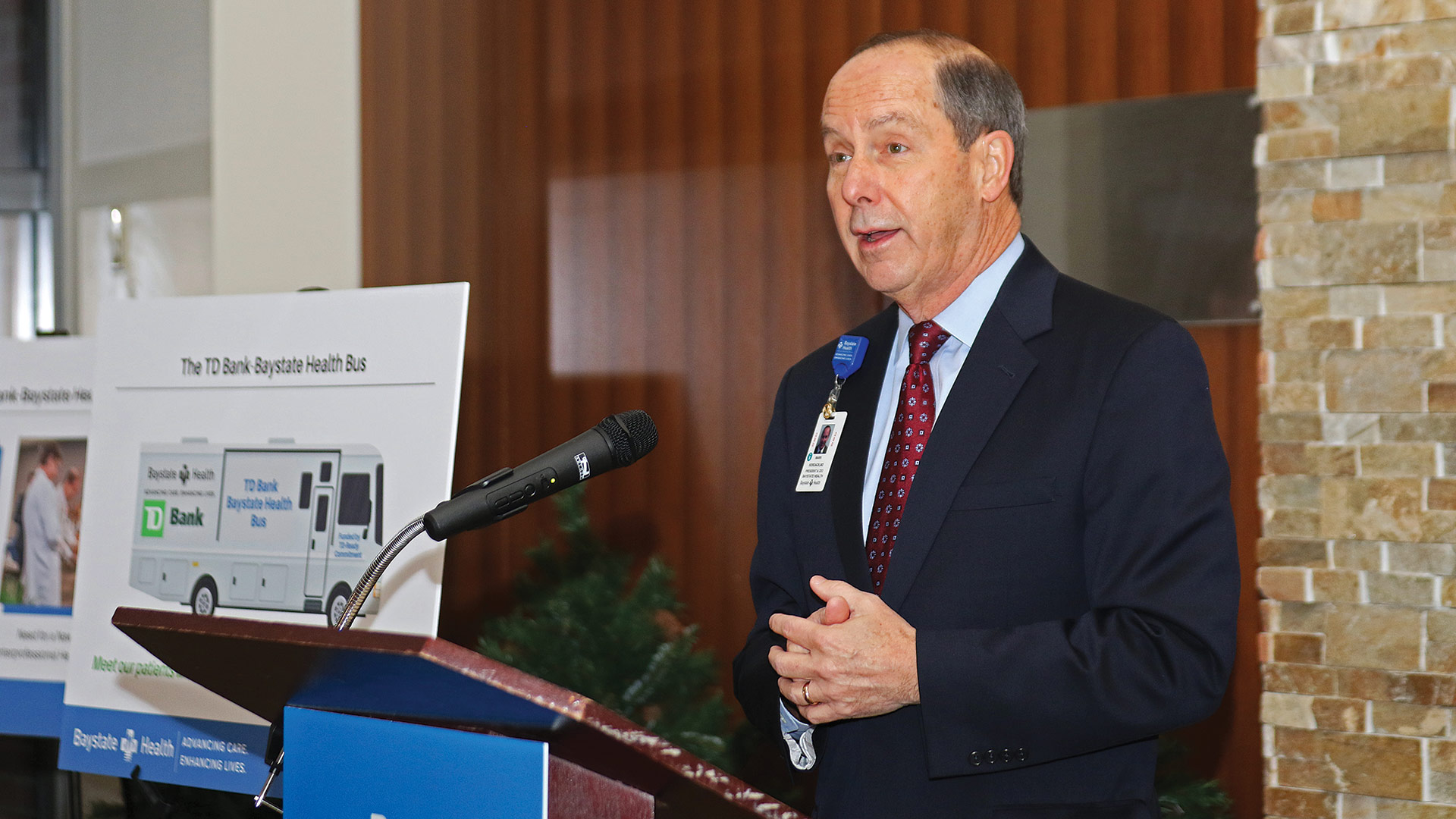
“It fits in a lot of ways with many of the things Baystate is doing and that we’re looking at in healthcare in general,” he went on, referring to that movement, if that’s what it could be called, to become less focused on bringing people to the doctor’s office — although such visits are still necessary — and more focused on taking service providers out into the community.
There are plenty of models for this kind of service, he said, including Boston’s famous Bridge Over Troubled Waters, or simply ‘Bridge,’ as many call it.
Created more than a half-century ago by members of the Sisters of St Joseph, that program began by providing services to runaway, homeless, and high-risk youths and guiding them to self-sufficiency. At first, Bridge founders provided sandwiches, cold drinks, supportive counseling, and referrals to healthcare and psychiatric services.
By the early ’70s, it was decided that these traditional services were not going to be enough, especially with a growing homeless population. So, in collaboration with a group of physicians from Massachusetts General Hospital, Bridge organized a volunteer-run mobile medical van to bring emergency and preventive healthcare to the streets — a service that has in many ways become a national model.
Baystate’s bus will operate in a somewhat similar fashion, with the focus predominantly on prevention, said Hinchey. And it will emphasize the team aspect of providing healthcare, with the team including doctors, nurses, nutritionists, and others — focused, again, not merely on treating people when they’re sick, but working with them to develop good habits and prevent diseases such as diabetes and hypertension.
“Those partners said they liked what we’re doing but wished that we had the ability to do more of. It dawned on us that a mobile office would be a way for us to go to people instead of people having to come to us.”
“Instead of telling people what to do, we can help them figure out the best way to do things,” Hinchey explained. “We need to take the lead from the community and follow.”
The mobile medical unit will likely be on the road by next summer, he noted, and between now and then, officials at Baystate will work with those aforementioned community partners to determine just which roads it will be on, where it might be parked, and how, specifically, it will be used.
Which brings us back to that notion of the ‘prevention block party.’ That conjures up notions of the RV parked in a cul-de-sac in East Longmeadow. And while that might happen, it is more likely that this facility will visit urban and very rural areas and focus on populations that would be considered underserved.
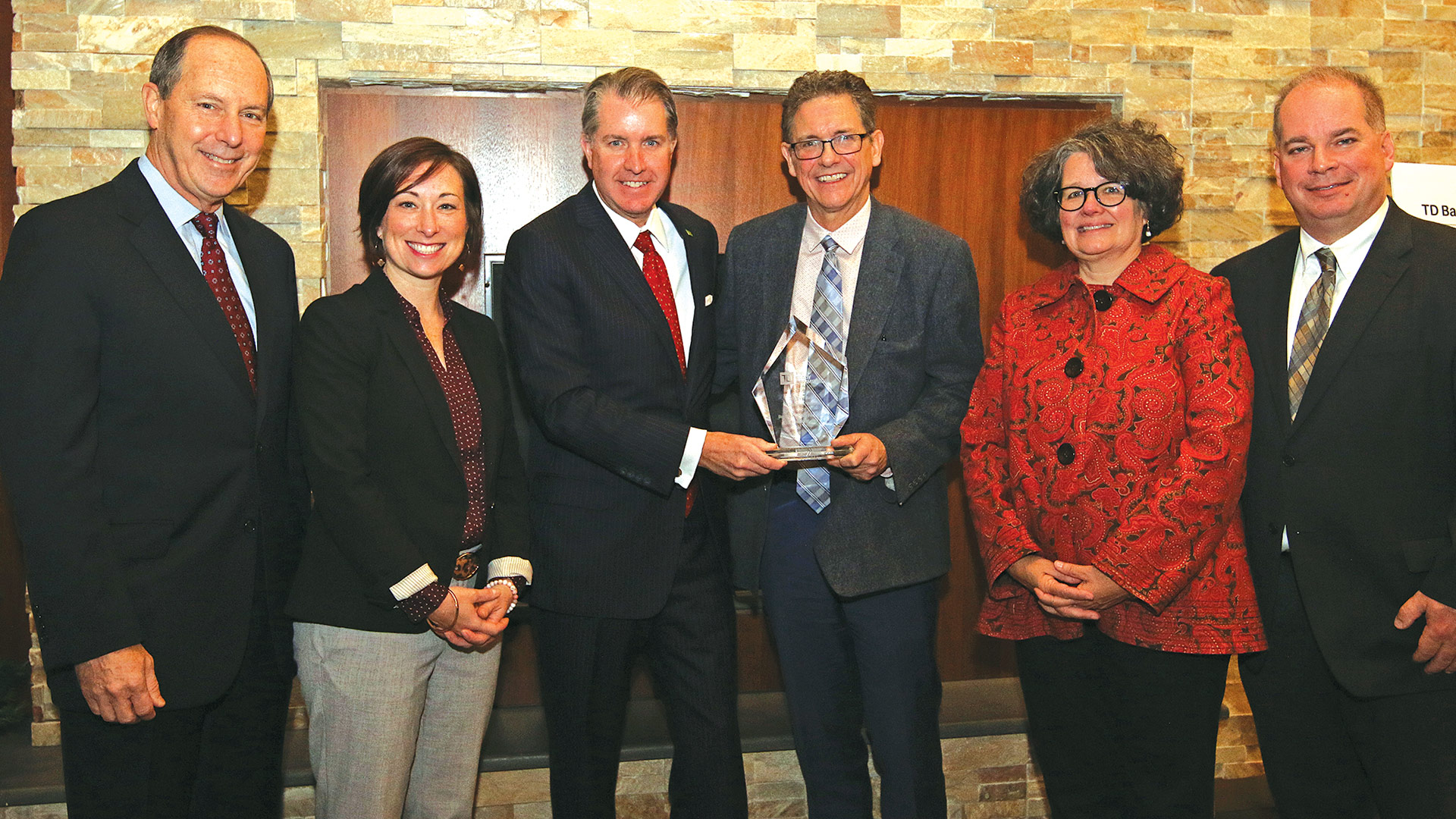
“We might be at a park because there are homeless people there, or there might be a congregation of people who might need preventive care,” he said, suggesting possible destinations and places to park. “This isn’t meant to be about real treatment, although we will have the ability to do some of that. This is really about educating people about the importance of prevention.”
Baystate now has a wide network of hospitals and medical centers under its umbrella, he went on, adding that these facilities serve both urban populations (such as Springfield’s Baystate Medical Center and its many neighborhood health clinics) and more rural areas (Baystate Franklin Medical Center in Greenfield and Baystate Mary Lane in Ware). And the ‘bus’ will be traveling to all these regions, he told HCN.
“Each one of these communities has slightly different issues,” he went on, adding quickly that there are several common denominators, including nutrition-related problems, substance-abuse issues, homelessness, and other factors that contribute to overall health and well-being, or lack thereof.
Meanwhile, lack of transportation is an issue for many in these areas, and this plays a part in preventive health, he said, adding that the mobile unit brings information — and someone to talk with about it — to these populations.
And, as noted, while the mobile medical unit will provide the region with new opportunities to help educate residents on healthier living and steps they can take — yes, eating kale goes on this list — it will also create intriguing learning experiences for those staffing the vehicle.
Hinchey expects these will be residents at Baystate Medical Center, students at the medical school, and perhaps students enrolled in area nursing and nutrition programs and the pharmacy program at Western New England University — a diverse team of individuals.
“We want to see if we can get all the learners — and with the learners, the teachers will come with them to make sure the content we deliver is accurate,” he said, adding that this team will be equipped with glucometers and other devices and will be able to conduct screenings and give flu shots.
Those involved with the project will spend the next several months putting together a curriculum, for lack of a better word, for this initiative, and there will be a number of players involved, said Hinchey, including those aforementioned community partners.
“We have to ask a lot of questions: what are the parks we should visit? Are there community centers we should go to? Are there religious organizations we can go to where we can meet people?” The answers to these questions, he added, will go a long toward formalizing that curriculum for the bus.
On the Road to a Healthier Community
When asked if the bus had a formal name, and if not, when it might have one, Hinchey thought for a minute and then said, “I’ll leave that up to people more creative than I am.”
While the name is in question, the mission, while still being formalized, is not. It is grounded in education and prevention — and bringing both to populations in need.
Hinchey doesn’t know exactly how this mission will be carried out — the prevention block party is still an idea being shaped — but he does know one thing.
“It should be very exciting,” he said. “There are a lot of possibilities.”


